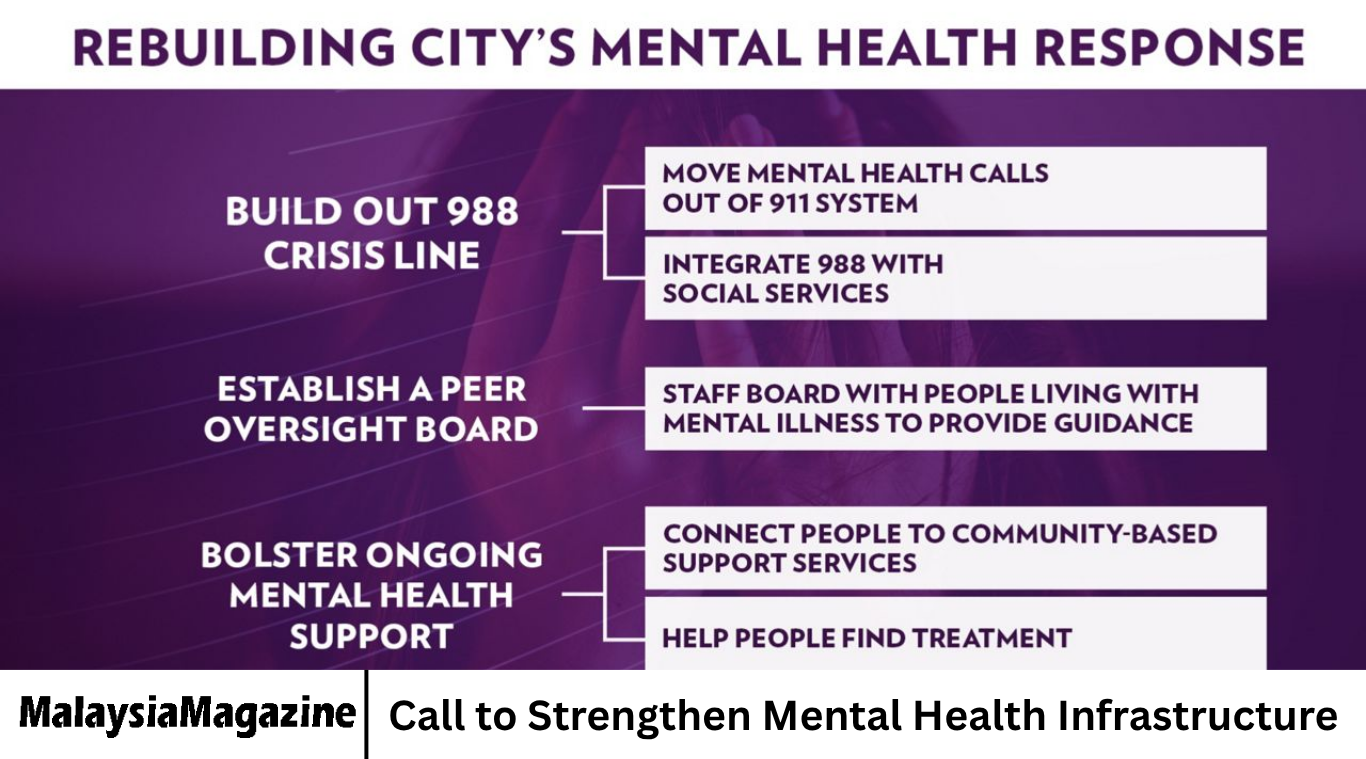Mental health has become a growing concern around the world, and Singapore is no exception. As more people face stress, anxiety, and other mental health challenges, experts and organizations are calling for stronger investment in mental health infrastructure.
The effects of modern life, including work pressure, social isolation, and the rising cost of living, have all contributed to a growing mental health crisis. While Singapore has made progress in raising awareness and providing support, many believe that the current mental health system still lacks the capacity to meet increasing needs.
The call to strengthen mental health infrastructure is not just about building more facilities. It also includes increasing the number of trained professionals, improving community support, reducing stigma, and integrating mental wellness into overall healthcare planning.
The Rising Mental Health Challenge
In recent years, mental health issues have become more visible and widespread across Singapore. Reports show that conditions such as depression, anxiety, and burnout are affecting people of all ages, from students to working adults and seniors.
The COVID-19 pandemic further intensified these problems, as isolation, uncertainty, and financial strain led to higher levels of distress. Surveys revealed a significant increase in people seeking mental health support during and after the pandemic.
Despite these trends, many individuals still face barriers to getting help. Long waiting times, limited access to specialists, and social stigma prevent people from reaching out early, often allowing their conditions to worsen before treatment begins.
Current Mental Health Infrastructure in Singapore
Singapore’s mental health system is anchored by institutions such as the Institute of Mental Health (IMH) and several general hospitals that provide psychiatric services. There are also community-based programs and helplines managed by non-profit organizations and government agencies.
However, these services are often stretched thin. IMH, for example, handles thousands of cases every year, with increasing demand putting pressure on its facilities and staff. While primary care clinics and polyclinics are gradually being equipped to handle basic mental health needs, capacity remains limited compared to the growing demand.
Community mental health services, though expanding, are still unevenly distributed. Many residents may not have easy access to affordable or timely mental health care in their neighborhoods.
Need for a Comprehensive National Framework
Experts argue that mental health should be treated as an essential part of public health, not a secondary concern. This requires a strong, coordinated framework that links hospitals, community organizations, and social services into a single support system.
The government has already begun developing the “National Mental Health and Well-being Strategy,” which aims to improve early detection, intervention, and access to care. Strengthening this framework will ensure that every individual — regardless of age or income — can get timely and effective mental health support.
A well-structured system would also help reduce duplication of services and ensure that patients receive continuous care as they move from hospitals to community support and back to daily life.
Increasing the Mental Health Workforce
A major part of improving mental health infrastructure is building a larger and better-trained workforce. Singapore currently faces a shortage of psychiatrists, psychologists, and counselors, making it difficult to meet rising demand.
Many general practitioners (GPs) and nurses are not yet fully equipped to handle complex mental health cases. To address this, training programs are being expanded to ensure that frontline healthcare workers can recognize and manage mental health symptoms effectively.
In addition, social workers, school counselors, and volunteers play an important role in providing emotional support at the community level. Investing in their training and welfare is essential for building a more inclusive mental health system.
Integration of Mental Health Into Primary Care
Another key step toward stronger mental health infrastructure is integrating mental health services into primary care settings. Polyclinics and GP clinics can serve as the first line of defense, identifying problems early before they become severe.
This integration allows for early diagnosis, ongoing monitoring, and referral to specialists when needed. Patients can receive mental health assessments alongside physical check-ups, helping reduce stigma and normalize mental wellness as part of overall health.
By empowering primary care doctors to handle mild to moderate mental health conditions, hospitals and specialized centers can focus on more complex cases, improving efficiency across the healthcare system.
The Role of Community Support
Community-based care is critical in promoting mental wellness. When mental health services are brought closer to where people live, it becomes easier to seek help without fear or inconvenience.
Community Wellness Centres, support groups, and local outreach programs help individuals manage stress, connect socially, and access counseling in familiar environments. Peer support initiatives, where individuals with lived experience provide guidance and understanding, have also proven to be highly effective.
Expanding these initiatives across all regions of Singapore will create a strong network of emotional and practical support that complements formal healthcare services.
Addressing Stigma and Public Awareness
One of the biggest barriers to seeking mental health care is stigma. Many people still view mental illness as a sign of weakness or something to be ashamed of. This cultural mindset prevents open conversations and delays help-seeking behavior.
Public education campaigns are vital in changing these perceptions. Schools, workplaces, and media platforms can all play a role in promoting understanding and empathy toward those with mental health challenges.
By treating mental health as a normal and important part of human life, Singapore can build a more supportive and inclusive society.
Mental Health in Schools and Workplaces
Mental health support must also extend to schools and workplaces, where stress often begins. Students face academic pressure, social anxiety, and uncertainty about their futures. Early intervention programs in schools can help identify issues before they escalate.
In workplaces, employers are being encouraged to create supportive environments by providing counseling services, flexible work arrangements, and stress management programs. Companies that prioritize employee well-being often see better productivity, reduced absenteeism, and stronger morale.
Building a culture of mental wellness across educational and professional settings is key to sustaining long-term progress.
Technology and Digital Mental Health Solutions
With advancements in technology, digital tools are becoming valuable allies in mental healthcare. Telehealth platforms, mobile apps, and online counseling services offer convenient access to support, especially for those who may hesitate to seek in-person help.
These digital options provide privacy, flexibility, and continuity of care, making them ideal for busy individuals or those living in areas with fewer mental health facilities. However, they should complement — not replace — traditional care, ensuring that patients with severe conditions receive proper medical supervision.
Funding and Policy Commitment
Building stronger mental health infrastructure requires consistent funding and policy commitment. Governments must allocate sufficient resources for training, facilities, research, and public education.
Singapore’s commitment to expanding its mental health strategy is an encouraging step. Continued investment will ensure that programs reach vulnerable populations, including the elderly, low-income families, and youth.
Transparent policies and collaboration between government agencies, healthcare institutions, and community partners will be key to long-term success.
Support for Vulnerable Groups
Certain groups are at higher risk of mental health challenges and require targeted support. The elderly may face loneliness and cognitive decline, while young people may struggle with identity, academic pressure, and social media influence.
Migrant workers, caregivers, and people with disabilities also face unique stressors that can affect their mental well-being. Providing culturally sensitive and accessible support for these groups is essential for achieving a truly inclusive mental health system.
Measuring Progress and Accountability
To ensure that mental health initiatives deliver results, progress must be measured regularly. Data collection, surveys, and patient feedback can help identify gaps and guide future improvements.
Accountability is equally important. Mental health strategies should include clear performance goals, such as reducing suicide rates, improving access times, and increasing community participation in mental health programs.
By setting measurable targets, policymakers can ensure that every effort contributes to real and lasting change.
Building a Resilient Society Through Mental Wellness
Strengthening mental health infrastructure is not just about treating illness. It is also about building a resilient and compassionate society where people can thrive emotionally and socially.
A strong mental health system supports better relationships, stronger communities, and greater national productivity. When people feel supported and understood, they are more likely to contribute positively to society.
By focusing on prevention, early intervention, and inclusivity, Singapore can build a healthier and happier future for all.
Frequently Asked Questions
Why is mental health infrastructure important?
A strong mental health infrastructure ensures that individuals have access to timely, affordable, and effective care for mental health issues, helping reduce suffering and improve quality of life.
What are the biggest challenges facing mental health services in Singapore?
Key challenges include limited specialist availability, long waiting times, public stigma, and uneven access to community-based care.
How can primary care clinics help with mental health?
Primary care clinics can provide early diagnosis, counseling, and referrals, making it easier for people to seek help without visiting specialized institutions.
What role does the community play in mental health care?
Community programs and support groups offer emotional, social, and practical help, allowing individuals to recover and stay well within their local environments.
How is Singapore addressing mental health awareness?
Public education campaigns, school programs, and workplace initiatives are helping to reduce stigma and promote open conversations about mental well-being.
Can digital tools help improve mental health access?
Yes, telemedicine and mental health apps allow people to access counseling and support conveniently, especially for mild or moderate conditions.
What is the government doing to improve mental health infrastructure?
The government is expanding services, increasing funding, training healthcare workers, and implementing the National Mental Health and Well-being Strategy to strengthen care across the country.
Conclusion
The growing demand for mental health services highlights the urgent need to strengthen Singapore’s mental health infrastructure. This includes expanding facilities, training professionals, improving community support, and integrating mental health into primary care.
Beyond healthcare, society as a whole must work to eliminate stigma, promote awareness, and support one another. A comprehensive, compassionate approach will ensure that every Singaporean has access to the mental health care they deserve.
















